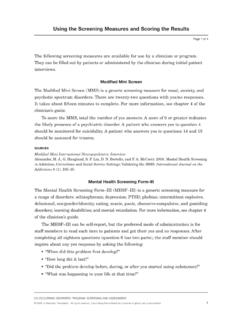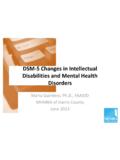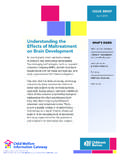Transcription of The Stress-Vulnerability Model of Co-occurring Disorders 6
1 83 2008 by Hazelden Foundation. All rights reserved. Duplicating this material for personal or group use is Disorders PROGRAM: FAMILY PROGRAMPage 1 of 5 Topic 2: The Stress-Vulnerability Model of Co-occurring Disorders6 HANDOUTThe Stress-Vulnerability Model of Co-occurring Disorders sThese are common questions raised by peoplewith Co-occurring Disorders and their family Stress-Vulnerability Model provides answers tothese questions. This Model can help in understandingthe causes of psychiatric Disorders , how psychiatric Disorders and addiction can influence each other, and how Co-occurring Disorders can be managed and the name suggests, two main factors are involved. vulnerability refers to our basic susceptibility to mentalhealth Disorders .
2 This is determined by our geneticmakeupand our early life experiences. It is affected by our use of medications, and our likelihood of usingalcohol or drugs. stress refers to the challenges facedin our lives. It is affected by our coping skills, socialsupport, and involvement in meaningful causespsychiatric Disorders ? Why do some people develop a psychiatric disorder but not others? What affects the course of the disorder? BiologicalVulnerabilitySymptom SeverityRelapsesAlcoholand druguseMedicationSocialSupportMeaningful ActivitiesCommunity FunctioningHospitalizationStressCopingSk illsSTRESS- vulnerability MODEL84 2008 by Hazelden Foundation. All rights reserved. Duplicating this material for personal or group use is Disorders PROGRAM: FAMILY PROGRAMB iological VulnerabilityIf we are vulnerable to something, it meanswe re more likely to be affected by it.
3 Forexample, some people might be biologically vulnerable to certain physical illnesses suchas heart disease or asthma. Maybe the diseaseruns in the family, or maybe something in ourearly life set us up for people are biologically vulnerable tocertain psychiatric Disorders : bipolar disorder,major depression, schizophrenia, or anxiety Disorders (panic, post-traumatic stress ), vulnerability is determined early in life by a combination of factors,including genetics, prenatal nutrition and stress , birth complications, and early experiences in childhood (such as abuse or the loss of a parent). This is why some families are morelikely to have members with a particular psy-chiatric vulnerability to psychiatric Disorders is primarily biological innature, people can take steps to reduce their vulnerability , including taking medication andnot using alcohol or drugs, as discussed on thenext page.
4 It s also worth noting that the greatera person s vulnerability to a particular disorder,the earlier it islikely to develop, and the moresevere it may , some people also have a biologicalvulnerability to developing an addiction: they are more likely to develop alcohol or drug abuseor dependence. This is why addiction, similarto psychiatric Disorders , sometimes runs infamilies. The Stress-Vulnerability Model of Co-occurring DisordersXPAGE 2 OF 56 HANDOUTWhat Are the Elements of theStress- vulnerability Model ?These two main areas biological vulnerability and stress are influenced by several other factorsthat people have some control factors include alcohol and drug use medication use coping skills social support meaningful activitiesThis means that by addressingthese factors (as described in thenext column), people can reducesymptoms and relapses andimprove the course of their Co-occurring Disorders .
5 Each of theparts of the stress -vulnerabilitymodel is discussed on the pagesthat Stress-Vulnerability Model of Co-occurring DisordersXPAGE 3 OF 585 2008 by Hazelden Foundation. All rights reserved. Duplicating this material for personal or group use is Disorders PROGRAM: FAMILY PROGRAMA lcohol and Drug UseUsing alcohol or drugs can increase a per-son s pre-existing biological vulnerabilityto a psychiatric disorder. Thus, substanceuse can trigger a psychiatric disorder andlead to more severe symptoms and otherimpairments. Because most people withco- occurring mental and substance usedisorders have a biological vulnerability to psychiatric Disorders , they tend to behighly sensitive to even small amounts ofalcohol and stress in the environment can worsen biological vulnerability , worsen symptoms,and cause relapses.
6 stress is anything thatchallenges a person, requiring some kind ofadaptation. Serious stressful events includelosing a loved one, getting fired from a job,being a victim of crime, or having conflictswith close is often associated with negativeevents, but positive events and experiencesmay be stressful as well. For example,performing well in school, getting a newjob, starting a new relationship, having ababy, or being a parent all involve somedegree of is also possible for stress to be causedby not having enough to do. When peoplewith Co-occurring Disorders have nothingpurposeful or interesting to do, they tend tohave worse symptoms and are more proneto using substances. So a lack of meaning-ful involvement in life in areas such aswork or parenting, for example can beanother source of SkillsDeveloping coping strategies can help withhandling stress and reducing its negativeeffects on vulnerability .
7 Examples of copingskills include relaxation skills for dealing with stressand tension social skills for connecting with people, dealing with conflict, and getting support coping skills for managing persistentsymptoms such as depression, anxiety,and sleeping problemsStress is a normal part of life. Effectivecoping enables people to be engaged ininteresting, rewarding activities that mayinvolve stress , such as working or being aparent. Coping efforts can make it possiblefor someone with Co-occurring Disorders tolive a normal life without suffering thenegative effects of in Meaningful ActivitiesHaving something meaningful to do withone s time gives one a sense of purpose,and reduces the stress of having nothingto do.
8 Meaningful activities can include: work school parenting or other caregiving responsibilities homemaking6 HANDOUT86 2008 by Hazelden Foundation. All rights reserved. Duplicating this material for personal or group use is Disorders PROGRAM: FAMILY PROGRAMThe Stress-Vulnerability Model of Co-occurring DisordersXPAGE 4 OF 56 HANDOUTT reatment implications of the Stress-Vulnerability ModelBased on an understanding of thestress- vulnerability Model , thereare many ways to help peoplemanage their psychiatric illnessand Co-occurring substance usedisorder. In the broadest terms,the severity and course of a Co-occurring mental health disordercan be improved by reducing biolog-ical vulnerability and increasingresiliency against SupportAnother way to reduce the negative effects of stress on vulnerability is through socialsupport, which comes from having close andmeaningful relationships with other people can help in a variety ofways, such as helping people solve challenging problems supporting people in using coping strategies to deal with symptoms and substance-use urges being open and willing to discussing and resolving personal disagreements,misunderstandings.
9 And areas of conflict that could otherwise lead to stress letting people know that they are important and cared about supporting the person in pursuing personally meaningful goalsPeople who have good social support areless vulnerable to the effects of stress on theirpsychiatric disorder. Therefore, having strongsocial support enables people with co-occurringdisorders to handle stress more effectively,and live a normal Stress-Vulnerability Model of Co-occurring DisordersXPAGE 5 OF 587 2008 by Hazelden Foundation. All rights reserved. Duplicating this material for personal or group use is Disorders PROGRAM: FAMILY PROGRAM6 HANDOUTR educing Biological VulnerabilityBiological vulnerability can be reduced in two primary ways: taking medicationand avoiding alcohol or drug use.
10 Medica-tion can be a powerful way of reducing biological vulnerability by helping to correctthe imbalances in neurotransmitters(chemicals in the brain responsible forfeelings, thinking, and behavior) believedto cause psychiatric Disorders . By takingmedication, the symptoms of a psychiatricdisorder can be lowered and the chances of having a relapse can also be alcohol and drug use canreduce biological vulnerability in two , because substances affect the brain,using alcohol or drugs can directly worsenthose vulnerable parts of the brain associ-ated with psychiatric Disorders . Second,using substances can interfere with thecorrective effects of medication on vulner-ability. This means that somebody who isusing alcohol or drugs will not get the full benefit of any prescribed medicationsfor his or her disorder, leading to worsesymptoms and a greater chance of Resiliency against StressIt is impossible for anyone to live a lifethat is free of stress .










